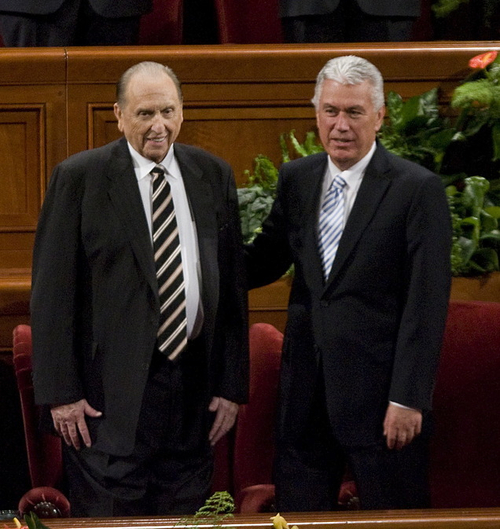This is an archived article that was published on sltrib.com in 2014, and information in the article may be outdated. It is provided only for personal research purposes and may not be reprinted.
A British judge will decide by Thursday whether a fraud case that disaffected Mormon Tom Phillips brought against LDS Church President Thomas S. Monson can proceed.
The Westminster Magistrate District Court heard arguments Friday about the legitimacy of alleged fraud related to elements of Mormon teaching.
Monson, the 86-year-old leader of the 15-million member Church of Jesus Christ of Latter-day Saints, in a Jan. 31 letter was summoned by the court to appear to answer the allegations, but the man considered "prophet, seer and revelator" by Mormons was not there in person.
In the intervening weeks, the nature of the hearing had changed.
"There was absolutely no requirement for President Monson to appear today," church spokesman Cody Craynor said in a Friday statement. "The church was represented by legal counsel to contest the appropriateness of the summons."
The charges are based on Britain's Fraud Act of 2006, meant to prosecute those who misrepresent themselves or their organizations for personal gain.
Phillips alleges that seven supposed Mormon claims are demonstrably false, including that the Book of Mormon, the church's signature scripture, was translated from ancient gold plates by church founder Joseph Smith; that the Book of Abraham, another text viewed as scripture, is a literal translation of Egyptian papyri by Smith; that American Indians are descended from an Israelite family that left Jerusalem in 600 B.C.; that "there was no death on this planet prior to 6,000 years ago" and that "all humans alive today are descended from just two people who lived approximately 6,000 years ago."
Phillips, who was represented by three lawyers, offered his perspective on the day's proceedings in a phone interview from a hotel in London, where he is staying.
The church's attorneys argued that the above statements are matters of faith, not statements of fact, Phillips said, and that the court cannot rule on the veracity of religious beliefs.
Second, he said, the LDS legal team tried to establish that Phillips' case is "vexatious," (similar to an American claim that a suit is "frivolous") and should be dismissed.
That matches the sentiment expressed by Craynor.
"Unfortunately there is nothing to stop a member of the public with a personal grievance playing this kind of mischief with the legal system," the spokesman said. "The church respects the judicial system and the law, and we are well prepared to see the process through. A court case which seeks to put a religion on trial for its theology has no precedent and we are ultimately confident that it will be dismissed."
For his part, Phillips thought the day went well and is equally confident of an outcome in his favor.
"I am certain at law we are correct," he said. "They tried to influence the judge from a religious-freedom argument; our answer is that a religion is not free to commit crime. Once they start to make false representations to make money, that goes into the area of fraud."



